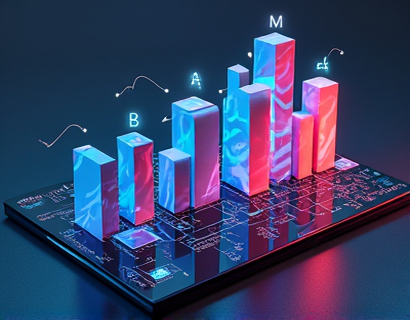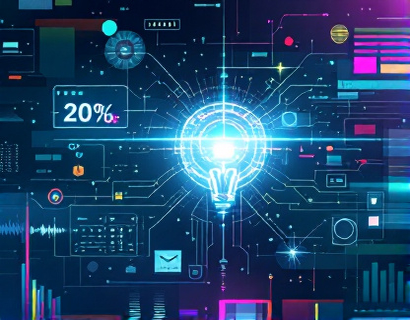Exploring the Synergy of Crypto and AI: A New Era of Digital Transformation
The intersection of cryptocurrency and artificial intelligence (AI) is giving birth to a new paradigm in digital transformation. This convergence is not just about combining two advanced technologies but about creating a synergy that enhances user engagement, revolutionizes digital experiences, and sets a new standard for connectivity. As we delve into this topic, it's essential to understand the individual roles of crypto and AI and how their integration is driving growth and innovation.
The Evolution of Cryptocurrency
Cryptocurrency, since its inception with Bitcoin in 2009, has evolved from a niche digital currency to a transformative force in the financial and technological sectors. Initially met with skepticism, cryptocurrencies have gained widespread acceptance as a decentralized, secure, and transparent means of transaction. The underlying blockchain technology has proven to be robust and resilient, offering a level of security and trust that traditional systems often lack.
Beyond finance, cryptocurrencies have opened new avenues for decentralized applications (dApps), smart contracts, and tokenized assets. These innovations have the potential to disrupt various industries, from supply chain management to healthcare, by providing transparent, efficient, and tamper-proof solutions. The decentralized nature of crypto ensures that no single entity has control, promoting a more democratic and inclusive digital ecosystem.
The Rise of Artificial Intelligence
Artificial intelligence, on the other hand, has been rapidly advancing, transforming the way we interact with technology and each other. AI encompasses a range of technologies, including machine learning, natural language processing, and computer vision. These technologies enable machines to learn from data, recognize patterns, and make decisions with minimal human intervention. The applications of AI are vast, from personalized recommendations in e-commerce to autonomous vehicles and advanced healthcare diagnostics.
AI's ability to process and analyze large datasets quickly and accurately has made it an invaluable tool across various sectors. It has the potential to optimize operations, enhance decision-making, and create more intuitive and user-friendly interfaces. The integration of AI into everyday technologies has already begun to reshape industries, making processes more efficient and user experiences more seamless.
Crypto and AI: A Perfect Synergy
The combination of cryptocurrency and AI is particularly potent, as each technology complements the other's strengths. Crypto provides a decentralized and secure infrastructure, while AI brings intelligence and automation to the table. This synergy is driving a new wave of digital transformation, enhancing user engagement and creating more robust and interactive digital experiences.
One of the key areas where crypto and AI intersect is in the development of decentralized finance (DeFi) platforms. DeFi leverages blockchain technology to create financial systems that are open, transparent, and accessible to everyone. AI can enhance DeFi by providing sophisticated risk management tools, predictive analytics, and automated trading algorithms. These tools not only improve the efficiency of financial transactions but also make them more secure and user-friendly.
Another significant application is in the realm of identity verification and digital identities. Traditional identity systems are often centralized, vulnerable to breaches, and prone to misuse. By combining blockchain and AI, it's possible to create decentralized identity solutions that give users full control over their personal data. AI algorithms can verify identities through biometric data and behavioral patterns, ensuring a high level of security and privacy.
Enhancing User Engagement Through AI-Driven Crypto Solutions
User engagement is a critical factor in the success of any digital platform, and the integration of AI in crypto solutions is revolutionizing how users interact with these systems. AI-driven chatbots and virtual assistants can provide 24/7 customer support, answering queries, and guiding users through complex processes. These AI-powered tools can understand natural language, making interactions more intuitive and efficient.
Personalization is another area where AI shines. By analyzing user behavior and preferences, AI can tailor recommendations and experiences to individual users. In the context of crypto, this means personalized investment advice, customized portfolio management, and targeted marketing campaigns. Users are more likely to engage with platforms that understand their needs and provide relevant content, leading to higher satisfaction and retention rates.
Gamification is another strategy enhanced by AI in crypto. By incorporating game-like elements such as rewards, challenges, and leaderboards, platforms can make the user experience more engaging and fun. AI can dynamically adjust these elements based on user behavior, ensuring that the experience remains fresh and motivating. This approach not only increases user engagement but also fosters a sense of community and competition.
Security and Trust: The Foundation of Crypto and AI Integration
Security and trust are paramount in the crypto space, and AI plays a crucial role in enhancing these aspects. Machine learning algorithms can detect and prevent fraudulent activities by identifying unusual patterns and anomalies in real-time. This proactive approach to security helps protect users' assets and maintains the integrity of the platform.
AI can also improve the transparency of crypto transactions. By analyzing blockchain data, AI can provide insights into transaction flows, helping to identify potential risks and ensure compliance with regulatory requirements. This level of transparency builds trust among users and stakeholders, fostering a more robust and reliable ecosystem.
Moreover, AI-driven security solutions can adapt to new threats as they emerge, providing a dynamic and robust defense mechanism. This is particularly important in a landscape where cyber threats are constantly evolving. The combination of blockchain's immutability and AI's adaptability creates a powerful defense against potential vulnerabilities.
Innovative Use Cases: Beyond Finance
While the financial sector is a significant beneficiary of crypto and AI integration, the potential applications extend far beyond. In the healthcare industry, AI can analyze medical data stored on blockchain to provide accurate diagnoses and personalized treatment plans. The decentralized nature of blockchain ensures data privacy, while AI enhances the efficiency and accuracy of medical processes.
In the supply chain, blockchain and AI can create transparent and traceable systems, reducing fraud and improving efficiency. AI can optimize logistics and inventory management, while blockchain ensures that all transactions are recorded and verifiable. This combination can lead to more sustainable and ethical supply chains.
The entertainment industry is another area where crypto and AI can drive innovation. Blockchain can enable decentralized content creation and distribution, giving creators more control over their work. AI can personalize content recommendations and even generate original content, enhancing the user experience and creating new revenue streams for content creators.
Challenges and Considerations
Despite the numerous benefits, the integration of crypto and AI is not without challenges. One of the primary concerns is the regulatory landscape. As both technologies operate in a relatively uncharted legal territory, navigating regulations can be complex. It's essential for developers and businesses to stay informed about regulatory changes and ensure compliance to avoid legal issues.
Another challenge is the technical complexity involved in integrating these technologies. Developing robust and scalable solutions requires expertise in both crypto and AI. Collaboration between experts in these fields is crucial to overcome technical hurdles and create seamless user experiences.
Privacy is also a significant concern. While blockchain offers transparency, it can also expose sensitive data. AI, with its data-processing capabilities, must be designed with strong privacy measures to protect user information. Implementing zero-knowledge proofs and other privacy-preserving techniques is essential to maintain user trust.
The Future of Crypto and AI: A Bright Horizon
The future of crypto and AI is promising, with ongoing advancements poised to unlock even more possibilities. As technology continues to evolve, we can expect to see more sophisticated and user-centric applications. The convergence of these fields will likely lead to the development of new economic models, enhanced digital identities, and more intuitive user interfaces.
The adoption of crypto and AI is also expected to grow, driven by increasing awareness and understanding of their benefits. As more businesses and individuals recognize the potential of these technologies, the demand for innovative solutions will drive further research and development. This growth will not only transform the digital landscape but also have a ripple effect on various industries, leading to a more connected and efficient world.
In conclusion, the synergy between cryptocurrency and artificial intelligence is a game-changer in the realm of digital transformation. By combining the security and decentralization of crypto with the intelligence and automation of AI, we are witnessing a new era of enhanced user engagement and innovative digital experiences. As we continue to explore and harness this synergy, the possibilities for growth and interaction in the digital realm are truly limitless.










































